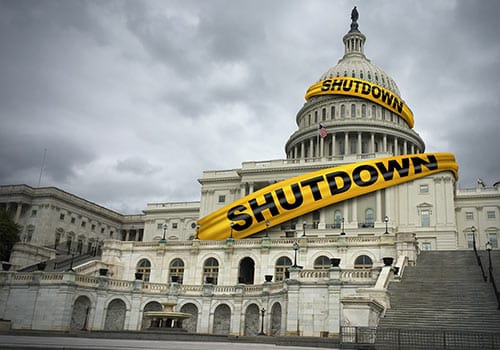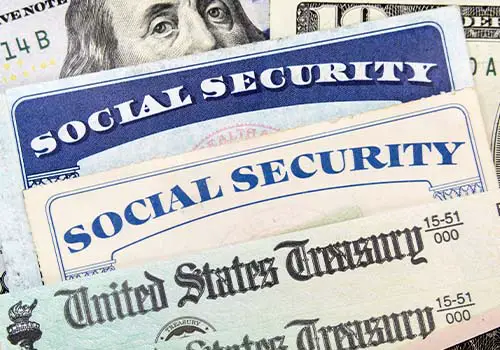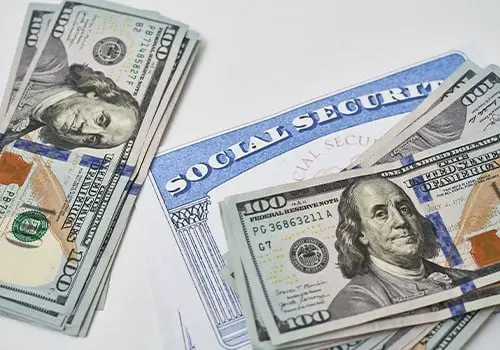The term “government shutdown” has appeared in news headlines more and more often over the past few years. The American government entered a shutdown three times during 2018. But what does it mean when the government is shut down?
Which government agencies are affected, and will your income be affected if you rely on Social Security payments or disability benefits? That answer depends on a few different factors that will be explained in this article. Keep reading to learn more about what a shutdown means and how it might affect you and your Social Security benefits.
What Is A Government Shutdown?
In short, a government shutdown occurs when the Federal government does not have enough money to continue operating and paying federal employees. Government agencies are funded through spending bills passed by Congress. Most budget bills passed by Congress include enough funding to operate the government for a few years. However, in some cases, temporary funding bills are passed to keep the government open for only a few weeks.
Expired Budget Bill
When the current budget bill expires, the Federal government is not authorized to spend the money to keep paying its employees. So, federal agencies like the Social Security Administration (SSA) and others run out of money to operate. Non-essential services typically shut down immediately, while essential services like Medicare and Social Security try to operate with reduced staff or limited service.
Essential Services
Thankfully, Social Security is considered an essential service, and it is typically not as affected by a shutdown as other agencies. For example, the National Parks, Environmental Protection Agency, Housing and Urban Development, and others are usually required to stop working completely. However, Social Security payments like SSI, SSDI, and retirement benefits are still paid during a shutdown. Even though payments are still sent, new applications and hearings may not be processed.
Length of Shutdown
A government shutdown can last anywhere from a day or two to months. It can be partial or complete shutdowns. There is no set timeframe for when a shutdown ends. It will last until Congress approves a new budget bill that provides funding for the closed agencies. In most cases, a shutdown lasts no more than a couple of weeks, although some have gone longer than that.
KEY TAKEAWAYS
- A government shutdown occurs when budget bills expire, and the federal government is not authorized to spend any more money.
- The SSA is considered an essential service, and all benefit payments will continue to be made during a government shutdown.
- Local Social Security offices typically remain open during a government shutdown, but have limited staff and potentially reduced hours.
Are Social Security Checks Affected by a Shutdown?
Typically, Social Security checks are not affected by a shutdown. Social Security payments do not require funding from Congress. These payments come directly from the Social Security Trust Fund, so the only funding required is for the employees managing these payments.
If you have already applied and been approved for benefits, you should continue receiving your regular payments. Even during the total shutdown of 1995, Social Security checks continued to be mailed to recipients on time. The SSA knows that people rely on this income for survival, so they will do everything possible to ensure that payments go out like normal.
Direct Deposits & Debit Cards
Today, it is even more accessible for people to get their checks. Since physical checks are no longer mailed, fewer people are required to administer payments through direct deposit and debit cards. These payments have not been affected by the shutdowns over the past few years. In some cases, SSA employees may even work without pay to ensure that payments continue to go out on time. As a shutdown draws near, the SSA usually puts a contingency plan in place to make sure those payments continue to happen.
Even though existing payments usually go out on time, there are some ways that a shutdown affects SSI and SSDI. If you have a pending application or are getting ready to apply for benefits, then you may be affected. Keep reading to learn how.
Must read articles related to Social Security Benefits
What Does The Government Shutdown Mean for SSI & SSDI?
As previously stated, existing Supplemental Security Income payments, Social Security disability benefits, and retirement benefit payments are usually not affected when the government shuts down.
Scheduled Hearings
Similarly, if you have a hearing scheduled with an administrative law judge, that hearing will likely occur as expected. However, support personnel are often placed on furlough, so your hearing office will be low on staff. Hearings will be limited to the claimant, judge, vocational expert, security staff, and essential personnel.
Since the support staff may not be working, the final decision on your hearing will probably not be made until after the shutdown is over. So, if you are approved for benefits, your payments will probably be delayed until the support personnel return.
Delayed Applications
If you are getting ready to apply for benefits, you can expect that your application will be delayed. The length of the delay depends on which state you live in. Since applications are initially reviewed at the local field offices and they make the initial disability determination, states usually decide whether to continue these operations. They will often work with SSA based on how many employees the SSA decides to keep at work during the shutdown.
In most cases, new applications continue to be processed, but at a slower pace. So, you can expect at least a delay in processing your new application. Should you receive a denial of benefits, you may not be able to schedule a hearing for reconsideration until after the shutdown ends. Even though existing hearings may continue, new hearings are typically not scheduled during that time.
TIP
SSI and SSDI benefits will continue during a government shutdown; however, new applications will probably be delayed. If you hear rumors of a shutdown, try to get your application in before the shutdown.
Are Social Security Offices Open During a Government Shutdown?
During a shutdown, local Social Security offices will usually close or have minimal staff. However, the coronavirus has already caused many services to be shifted from traditional in-person processing to online services.
Registering for a My Social Security account online is a good idea. This will allow you to access many services and benefits, prevent someone else from using your Social Security number to commit identity theft and sign up for benefits using your information. Enrollment for an account is simple, and it allows you to apply for benefits, get a replacement Social Security card, and many other valuable services.
If you cannot use the online system to process your request, you should call the Social Security phone number at 800-772-1213 for assistance. Always call before visiting your local office, as they are likely closed or working only on limited appointments.
The Bottom Line
If you receive Social Security benefits, you can be confident that those payments will continue even during a government shutdown. However, if you are going through the application process, you should expect delays in processing. Limited staff and office closings will result in longer wait times for application processing.
It would help if you tried to complete as much as possible online and always called your office before visiting in person.
While most shutdowns are over within a week or two, it is impossible to know precisely when they will end. As soon as Congress approves a new spending bill, operations will resume as usual. Just know that it will likely take some time to clear the backlog created by the shutdown.
Frequently Asked Questions
A widow can generally collect her husband’s Social Security at age 60. The husband must have worked for at least ten years in most cases, although there are some exceptions for younger individuals with minor children.
Suppose the widow already receives spousal benefits from her husband’s Social Security. In that case, those benefits will be automatically switched to survivor benefits once the Social Security Administration is notified of the death.
Spousal benefits are received while both spouses are still alive. This often happens when one spouse is the primary earner, and the other does not have a significant earnings history.
In that case, you can receive spousal benefits based on your spouse’s earnings record. The maximum benefit is 50% of the primary insurance amount. However, when a spouse dies, the widow or widower can receive survivor benefits. This benefit can be up to 100% of the deceased spouse’s benefit amount.
There is no age limit to receiving survivor benefits. If the surviving spouse is 60 or older, they will continue to receive those benefits for life. However, if the surviving spouse is younger than 60 and gets remarried, they will no longer be eligible to receive survivor benefits from their previous spouse’s earnings record.
Similarly, a younger spouse who receives benefits while caring for a child of the deceased will stop receiving benefits when the child turns 18. That same spouse can restart survivor benefits when they reach age 60, provided they have not remarried.
To start benefits, the widow needs to be 60 or older. If the widow is disabled, then she can start benefits at age 50. Once benefits have begun, there is no age limit to receiving the benefits.
She will continue to receive them for life, just like regular Social Security retirement benefits. There is one exception. If the widow is younger and caring for the deceased’s child, then her payments will stop when the child turns 18. Assuming she does not remarry, she can start her survivor benefits again when she reaches age 60.
You can find a Social Security Administration office near you by using our SSA office locator and searching for your closest location.






